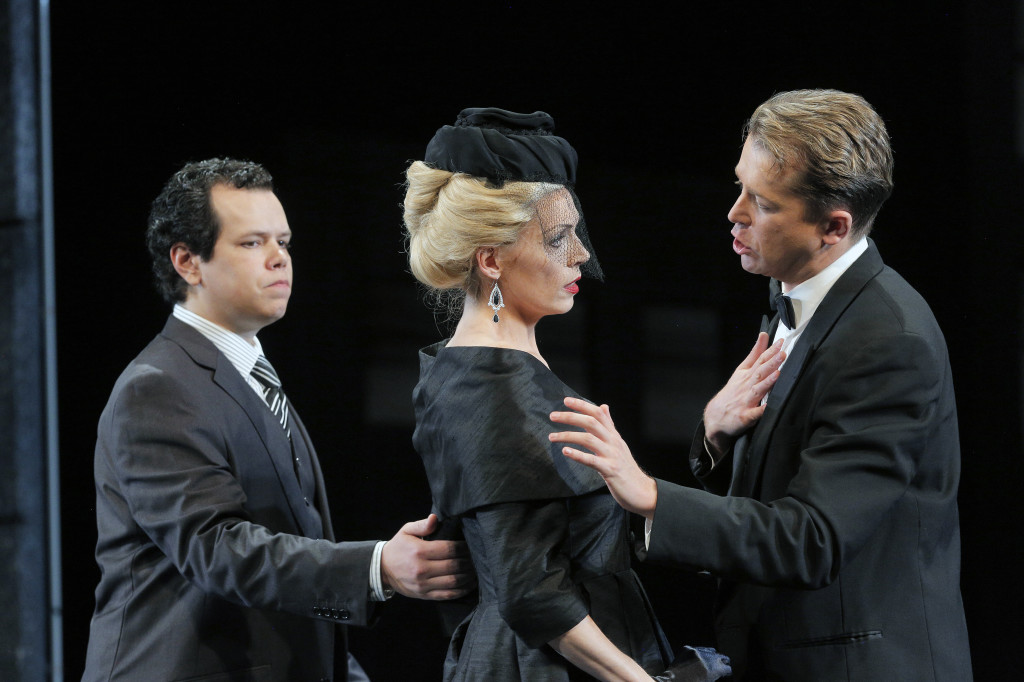CAN’T FIGHT THIS FEELING: Lyric Opera ‘Giovanni’ exploits visual, emotional contrasts
By Paul Horsley
The Lyric Opera’s newish production of Don Giovanni, which opened September 26th at the Kauffman Center, embraces the opera’s light-dark contrasts in ways both external and internal. By setting the 1787 opera as a film noir the production opens up design possibilities that exploit the chiaroscuro nature of such movies as The Big Sleep and The Third Man. At one point, in fact, the Don casts a long shadow onto a big blank wall that seems a clear reference to the latter film. More telling are the internal explorations of character relationships, which juxtapose light and darkness, comic and tragic in unsettling ways that seem true to the spirit of Mozart’s and Da Ponte’s dramma giocoso. The company has brought some excellent singers to the task, and together with sure-handed director Kristine McIntyre they yank these tortuous and often erotic moments into the center of the dramatic focus.
Set designer R. Keith Brumley earns kudos for creating sharp-looking B-movie sets on what appears to have been a tight budget. From the vague upstage cityscapes to the back-alley brick walls, the designs evoke tawdy nights with Welles and Cotten, Stanwyck and MacMurray, Bacall and Bergman and Bogart. The ballroom scene of Act I is set in “Giovanni’s,” a nightclub that comes complete with neon sign suggestive of “Rick’s Café Américain” in Casablanca (with a whiff, perhaps, of the Café Momus of La Bohéme). The graveyard of Act II is stylishly designed, though I rather missed the visual coup of the Commendatore’s stony statue coming to life. Lighting designer Marcus Dilliard takes the film noir experience to heart, at times with single-source lighting that creates intentionally off-kilter effects, and Mary Traylor’s costumes for the leads are cleverly fabulous evocations, almost entirely in black-and-white, of favorite film moments (though the wedding guests’ outfits seem oddly multifarious).

Mozart’s Don Giovanni is a man who (depending on how he’s played) seems at once bewildered by the ease with which women respond to him, and remorseless as to the consequences of his heartless seductions. Here even the women he has betrayed (Donna Elvira), or random girls who are about to marry other guys (Zerlina), are not immune to his neck-nuzzlings. Daniel Okulitch plays up the lightheartedness of the role, and when he stands and really sings (“Deh vieni alla finestra”) he displays a deliciously honeyed, almost-too-tender baritone. He seems like a friendly enough Don, rather than a commandingly sinister figure, which perhaps makes his horrid crimes all the more jarring.
Rachelle Durkin is wonderfully convincing as Donna Anna, tortured and guilt-ridden to the point of a near breakdown, her voice soaring gloriously with easy control in her big Act I scene. (As the ghost of her father, the Commendatore, crosses upstage—nice touch!—she suddenly realizes that Giovanni was both the dark figure in her boudoir and her father’s killer.) Matthew Plenk is a winning presence as Don Ottavio, singing his Act II “Il mio tesoro” with a clear-eyed, intelligent bel canto and carving out a heroically supportive, rather than a pitiful, Ottavio. The dramatic and vocal chemistry between Matthew and Rachelle is so palpable that you really want their hapless characters to work out their difficulties (but you know they probably won’t).

Elizabeth Caballero as Elvira is a haunting, willful ex-lover, out for blood until Giovanni asks her back, at which point she’s ready to forgive. A highlight of the evening is the brief, prayer-like trio in the Act I finale (“Protegga il guisto ciel”), a moment of respite in which these three lovely voices are allowed to blend and merge in harmony.
Samantha Gossard sings Zerlina with exceptional clarity and poise, and Joshua Bloom delivers a witty, complicated Leporello with a sweetly virile voice that at times gets swallowed in ensemble scenes. Richard Wiegold as the Commendatore appears onstage several times even after his violent demise, his rich bass voice amplified in the finale to sound eerie. Rhys Lloyd Talbot plays Masetto less as an offended servant trying to maintain dignity than as a comical high school nerd looking to “get lucky.”
There are some other directorial misfires: I yearned for the clank of swords in the opening scene (it’s almost like a part of the “soundscape” of Giovanni, though anachronistic for a film noir to be sure), and the mixture of dance styles (including jitterbug and “the twist”) for the courtly minuet of Act I seems peculiar. Gary Thor Wedow leads the Kansas City Symphony with brisk energy, and the chorus of 16 performs and acts capably throughout. A couple of Gary’s tempos felt draggy (the “Molto Allegro” of the Overture, for instance, or the opening of Anna’s big Act II scena), and some of the longer numbers (such as the great quartet “Non ti fidar”) might have benefitted from a more consistent pulse.
![Cast (ft. [L to R] Rhys Lloyd Talbot, Samantha Gossard, Elizabeth Caballero, Joshua Bloom, Daniel Okulitch, Matthew Plenk, R. Durkin)](http://www.kcindependent.com/wp-content/uploads/2015/09/Cast-ft.-L-to-R-Rhys-Lloyd-Talbot-Samantha-Gossard-Elizabeth-Caballero-Joshua-Bloom-Daniel-Okulitch-Matthew-Plenk-R.-Durkin-1024x672.jpg)
The authors of this opera left us with two basic versions, one for Prague and one for Vienna, and with two drastically different endings. Romantic-period productions often preferred closing with the blood-and-thunder of the Don’s demise, whereas contemporary versions have often re-embraced the more balanced lieto fine. At the risk of delivering a spoiler, I’ll just say this: Considering that the finales of Giovanni include some of the greatest music produced by Western civilization, is “less” really “more”?
Don Giovanni runs through October 4th at the Kauffman Center. Call 816-471-7344 or visit kcopera.org.
To reach Paul Horsley, performing arts editor, send email to phorsley@sbcglobal.net.
A slider with the ID of 2 was not found.









